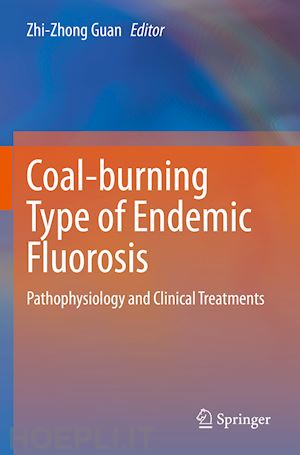
Questo prodotto usufruisce delle SPEDIZIONI GRATIS
selezionando l'opzione Corriere Veloce in fase di ordine.
Pagabile anche con Carta della cultura giovani e del merito, 18App Bonus Cultura e Carta del Docente
Endemic fluorosis is caused by excessive intake of fluorine in drinking water, air, food, tea and other media in a specific natural environment for a long time, which involves at least 25 countries, such as China, India, Vietnam, Iran, Egypt, Mexico, Argentina and influences more than 200 million of population. China and India are the countries with the most extensive endemic fluorosis and the most serious damages. There are three main intake sources of endemic fluorosis, e.g., drinking water, coal-burning pollution and drinking tea. Coal-burning type of endemic fluorosis was established in Guizhou Province of China in 1970’s. The residents in the areas used indoor stoves with no flue to burn coals with high content of fluoride to bake grains in the autumn and heat in the winter. This results in excessive intake of fluorine and then leads chronic poisoning. It has been confirmed that 13 provinces of China with 34.3 million of population are influenced by this type of fluorosis with severe injuries to most organs of human body. The content of this book covers the epidemiology, pathological changes, molecular pathogenesis and clinical treatments of the disease. This book is a suitable reference for the researchers and graduate students in this field, which is helpful to improve the understanding of this disease and to take preventive measures.
Chapter 1. Discovery and Concept of Endemic Fluorosis.- Chapter 2. Epidemic Status of Coal-burning Type of Endemic Fluorosis.- Chapter 3. Skeletal Fluorosis.- Chapter 4. Medical Imaging Manifestation of Skeletal Fluorosis.- Chapter 5. Epidemic characteristic and pathogenesis of dental fluorosis.- Chapter 6. Damage in Nervous System.- Chapter 7. Modification of Digestive System .- Chapter 8. Modification of Urinary System.- Chapter 9. Modification of Cardio-Vascular System.- Chapter 10.Damage of Endocrine System.- Chapter 11. Damages to Reproductive System by Coal-burning Type of Endemic Fluorosis .- Chapter 12. Enhanced Oxidative Stress .- Chapter 13. High Level of Inflammation.- Chapter 14. Effect of Fluoride on Signal Transduction Pathways.- Chapter 15. Changes of Receptors.- Chapter 16. Alteration of Endoplasmic Reticulum Stress.- Chapter 17. Mitochondrial Changes.- Chapter 18. Calcium Metabolism Disorder in Chronic fluorosis .- Chapter 19. Altering of Carbohydrate Metabolism .- Chapter 20. Changes in Gene Expression .- Chapter 21. Biological Indicators for Early Diagnosis of Endemic Fluorosis.- Chapter 22. Comprehensive Prevention and Control of Coal-burning Type of Endemic Fluorosis.- Chapter 23. Surgical Treatment of Joint Damage in Skeletal Fluorosis .- Chapter 24. Clinical Treatment of Dental Fluorosis .- Chapter 25. Drug Development .- Chapter 26. Improvement of Health Condition of the Residents in the Areas of Coal-burning Type of Endemic Fluorosis after Comprehensive Treatments.
Prof. Zhi-Zhong Guan is a professor in Guizhou Medical University and director of Key Laboratory of Endemic and Ethnic Diseases of the Ministry of Education of China. He was the president of International Society for Fluoride Research (ISFR). He also serves as the regional editor of the international journal “Fluoride”, which is the official journal of ISFR. Prof. Guan’s research focuses on molecular mechanisms of endemic disease and neurodegenerative disease. He has published around 150 articles on international journals.











Il sito utilizza cookie ed altri strumenti di tracciamento che raccolgono informazioni dal dispositivo dell’utente. Oltre ai cookie tecnici ed analitici aggregati, strettamente necessari per il funzionamento di questo sito web, previo consenso dell’utente possono essere installati cookie di profilazione e marketing e cookie dei social media. Cliccando su “Accetto tutti i cookie” saranno attivate tutte le categorie di cookie. Per accettare solo deterninate categorie di cookie, cliccare invece su “Impostazioni cookie”. Chiudendo il banner o continuando a navigare saranno installati solo cookie tecnici. Per maggiori dettagli, consultare la Cookie Policy.